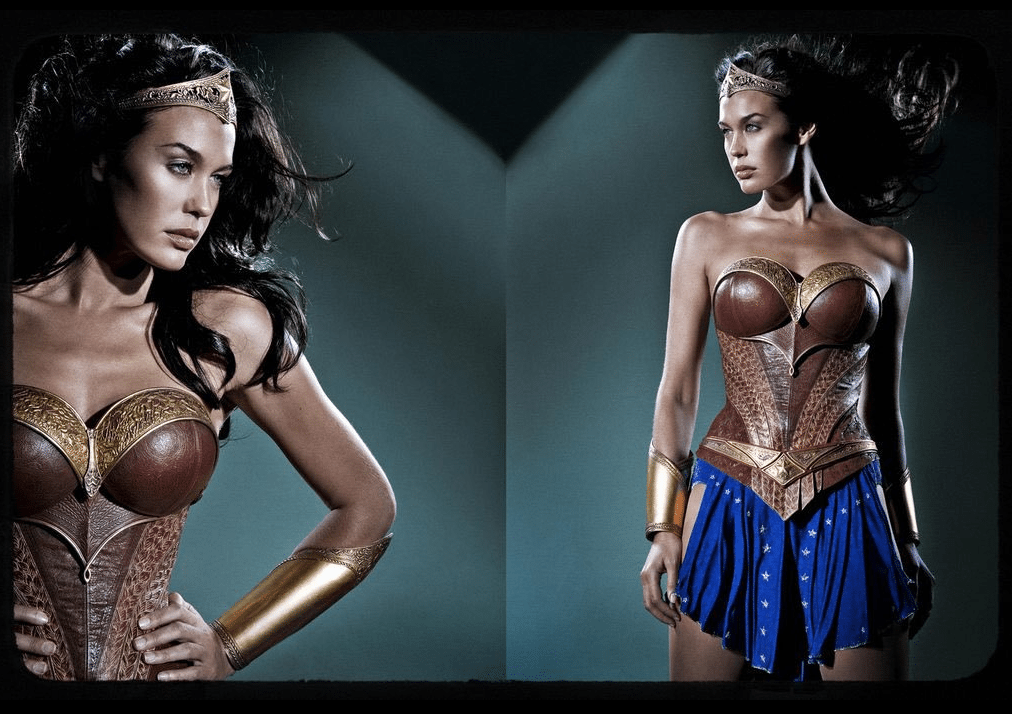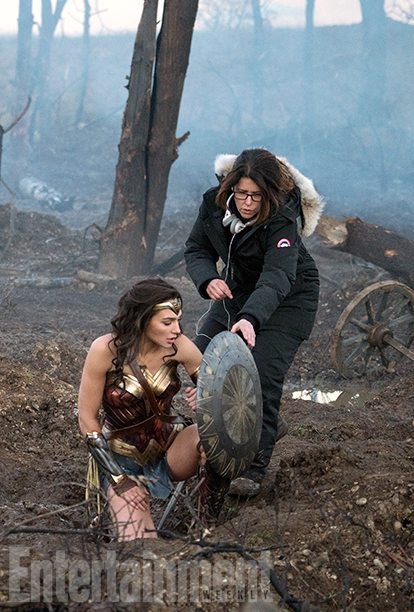In less than one year, we will finally see Wonder Woman in a solo live action feature film! The road was long, and winding at times—two decades of rumors and speculations to be exact. And it’s important to look at the history of what could have been and why it took so long.
In the early 1990s, when the Batman movies were at peak-popularity (despite Schumacher’s efforts), there was talk about extending the DC universe within a film franchise. As some of you may or may not know, Nicholas Cage was tapped to play Superman (and there are pictures to prove it). This lead fans to believe that a World’s Finest film might be on the horizon, and that many other DC comic book characters might finally have their own movies.
Back in 1996, it was reported that Ivan Reitman was attached to produce (and possibly direct) a Wonder Woman feature film, but that’s as far as that project went. Fast forward three years and the rumours were Sandra Bullock was the front-runner for a Wonder Woman adaption by Jon Cohen produced by Joel Silver (under his company Silver Pictures) and Warner Bros. But again, talk was all the public got from Hollywood.
It wasn’t until 2005 when Warner Bros. and Silver Pictures announced that Joss Whedon would write and direct Wonder Woman and fans rejoiced, because they could trust their fellow fan-boy to deliver. Because of the timing/his commitments on Serenity, Whedon promised he would start researching and writing the script later that year. However, two years later, the script was still only in the drafting stage. In early 2007, Whedon officially left the project, leaving fans to speculate again on when they would see Wonder Woman on the big screen.
Just before Whedon’s departure, Silver bought a spec script by Matthew Jennison and Brent Strickland that was an origin story set during World War II (this sounds familiar, doesn’t it?). Except Joel Silver didn’t want a “period piece” and a year later asked Jennison and Strickland to write another script with less focus on Diana and more on the history of her birthplace Paradise Island/Themyscira.
In 2009, a Justice League movie directed by George Miller (of Mad Max fame) was set to be released. Everyone was cast, including Wonder Woman (Fury Road’s Megan Gale), but it fell through due to a “number of reasons, some of which include the writers strike and the Dark Knight series, which was still on ongoing at the time” (x).

In the last five years, many directors and producers have said they would be interested in piloting a Wonder Woman movie. Director Nicolas Winding Refn and actress Christina Hendricks, who worked together on Drive, publicly talked about making a Wonder Woman film together in 2011. David S. Goyer, a writer attached to many DC feature films, said in 2013 that he would love to make a Wonder Woman movie (x). Later in 2013, in an interview with IGN, director Paul Feig (Bridesmaids, Spy, Ghostbusters) pitched an action-comedy Wonder Woman film for the studio.
Clearly, a lot people in Hollywood have expressed their interest in having a Wonder Woman movie—the desire is there. Heck, fans even created amazing self-produced trailers, because they wanted something with Diana! So why has it taken so long for the supply to reach the demand?
The more I read old articles, the more infuriated I become at the same, dull answers that are repeated every time someone asks “when will we see a Wonder Woman movie?” And I’m not the only one; many people have voiced their exasperation throughout the years.
President of DC Entertainment, Diane Nelson, acknowledged the (lack of) Wonder Woman issue in an interview with The Hollywood Reporter in July of 2013, and said:
“We have to get her right, we have to. She is such an icon for both genders and all ages and for people who love the original TV show and people who read the comics now. I think one of the biggest challenges at the company is getting that right on any size screen. The reasons why are probably pretty subjective: She doesn’t have the single, clear, compelling story that everyone knows and recognizes. There are lots of facets to Wonder Woman, and I think the key is, how do you get the right facet for that right medium? What you do in TV has to be different than what you do in features. She has been, since I started, one of the top three priorities for DC and for Warner Bros. We are still trying right now, but she’s tricky.”
Since the mid-1970s, there have been eight Batman feature films and seven Superman feature films. In that same time, Princess Diana of Themyscira, better known as Wonder Woman, has had only one appearance in a live action feature film—as a secondary character—in Batman v Superman: Dawn of Justice, wonderfully played by actor Gal Gadot. (Lets not forget that there was even a failed Green Lantern solo movie somewhere during that period!) Diana’s role in Dawn of Justice was amazing— she truly stood out among her more seasoned screen associates. So why, in the span of forty year, has Wonder Woman not been given the same level of prominence in mainstream media as her male counterparts?

For those combined fourteen Batman and Superman films, I don’t remember a single time hearing a director say that they “had to get it right.” But maybe that’s because there had been so many adaptations before them and they understood that the general public knows so much about the male superheroes already. The origin of Bruce Wayne is a tale as old as time at this point—even if it’s done wrong, people still know what the basic idea is. But because Wonder Woman has not been given this luxury, the longer we wait, the more pressure there will be to get it right.
And the idea—this old-school approach to film making—that a movie with one or multiple female leads will not earn as much money at the box office as a male driven movie simply is not true. Since Nelson’s comments, there have been a plethora of female driven movies that have debunked this theory. Many Young Adult book-to-film adaptations have a women at the helm, like The Hunger Games and Divergent series. Paul Feig’s work as a director in the past decade highlights that women are funny. The resurgence of Star Wars films has thrust women in the forefront as leaders and action stars. And need I mention Mad Max: Fury Road?
The examples above prove that there is a profit to telling a woman’s story. Yet, so many Hollywood execs seem to have doubts, and it’s because of this attitude that it’s taken this long to see a solo superhero movie for such an iconic American character.
As much as I want to solely blame the long wait for a Wonder Woman movie on Hollywood’s sexism, I also believe the problem was that DC/Warner Bros. did not have a clear vision in mind. They are not the tight unit that Marvel/Disney is, and it’s very clear. DC has always been too hungry for competitive success—there were too many cooks, and it became a mess. A perfect example of this is the (failed) Justice League: Mortal movie clashing with the (then ongoing) Dark Knight films. They wanted to make a Wonder Woman movie as much as fans wanted to see one, but they didn’t know how to approach it.
DC has tried to expand their film universe several times. The Nic Cage/Superman reboot or the recent Green Lantern bomb were both attempts. It wasn’t until 2013’s Man of Steel that DC and Warner Bros. put the idea back on the table. If it was successful, Man of Steel would be used as a launching pad for the other DC films and would set the tone of the universe.
It was in October of 2014, when DC/Warner Bros. announced their extended film and cast lineup with Gal Gadot as Wonder Woman, that everything seemed to move onto the fast track. However, at this point, DC had several successful and upcoming television shows (Arrow, The Flash, Constantine, Gotham, iZombie), and many wondered if Warner Bros. was going to mimic the shared universe concept that Marvel/Disney had created with their ABC and Netflix shows. But DC’s chief creative officer Geoff Johns explained their difference in approach, saying:
“We look at it as the multiverse. We have our TV universe and our film universe, but they all co-exist. For us, creatively, it’s about allowing everyone to make the best possible product, to tell the best story, to do the best world. Everyone has a vision and you really want to let the visions shine through […] It’s just a different approach.”

Warner Bros. asserted their desire to have a female director helm the Wonder Woman movie when they announced the film in late 2014. Directors like Catherine Hardwicke, Mimi Leder, Julie Taymor, and Michelle MacLaren were all rumoured to be approached, but the front runner seemed to be Oscar winner Kathryn Bigelow (x). Ultimately Michelle MacLaren—who is very well known for her work in television (The X-Files, Breaking Bad, The Walking Dead, Game of Thrones)—was signed to direct shortly after.

A few months later, in April of 2015, MacLaren left the project due to “creative differences,” and within the month’ director Patty Jenkins (Monster, The Killing) was confirmed to have taken over directing. Ironically, Jenkins was originally slated to direct Thor: The Dark World, but left the project, citing creative differences also. She would have been the first female director of a Marvel movie.
Production started in the fall of 2015 with filming locations in the United Kingdom, France and Italy (x). Actor Gal Gadot tweeted on May 9th, 2016 that Wonder Woman had wrapped on filming and is now in post-production. With a June 2nd (2017) release date, Wonder Woman will become the first summer tentpole (superhero) film directed by a woman, and Jenkins will be the first woman to direct a superhero film with a female protagonist (x).

